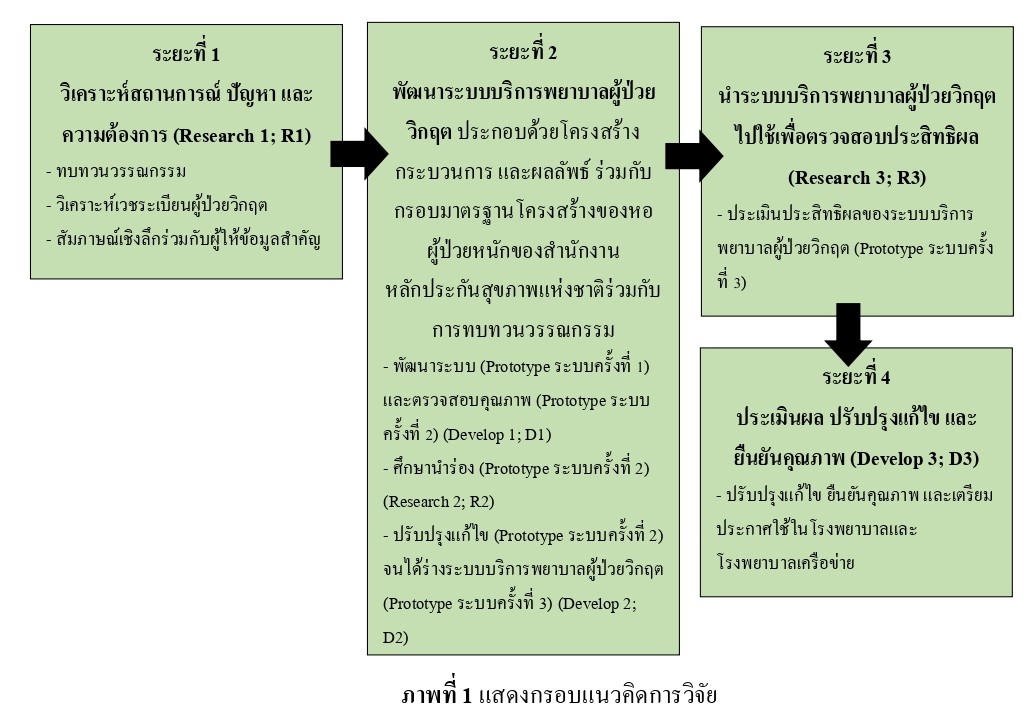การพัฒนาระบบบริการพยาบาลผู้ป่วยวิกฤตเครือข่ายโรงพยาบาลมหาสารคาม
คำสำคัญ:
การวิจัยและพัฒนา, ระบบบริการพยาบาล, ผู้ป่วยวิกฤต, เครือข่ายโรงพยาบาลบทคัดย่อ
การวิจัยและพัฒนานี้ มีวัตถุประสงค์เพื่อพัฒนาและประเมินผลการใช้ระบบบริการพยาบาลผู้ป่วยวิกฤตเครือข่ายโรงพยาบาลมหาสารคาม ประกอบด้วย 4 ระยะ คือ 1) วิเคราะห์สถานการณ์ ปัญหาและความต้องการ 2) พัฒนาระบบบริการพยาบาลผู้ป่วยวิกฤต ตรวจสอบคุณภาพ และศึกษานำร่อง
3) นำระบบบริการพยาบาลผู้ป่วยวิกฤตไปใช้เพื่อตรวจสอบประสิทธิผลในผู้ป่วยวิกฤต 240 ราย และพยาบาลวิชาชีพ 116 ราย และ 4) ประเมินผล ปรับปรุงแก้ไข และยืนยันคุณภาพของระบบ เครื่องมือวิจัยประกอบด้วย แบบสัมภาษณ์เชิงลึก แบบบันทึกผลลัพธ์การพยาบาล แบบประเมินโครงสร้างระบบบริการพยาบาลผู้ป่วยวิกฤต แบบทดสอบความรู้ แบบประเมินการปฏิบัติการพยาบาล แบบประเมินความพึงพอใจ และแนวคำถามสำหรับการสนทนากลุ่ม ซึ่งเครื่องมือทั้งหมดผ่านการตรวจสอบคุณภาพโดยผู้ทรงคุณวุฒิ จำนวน 5 ท่าน ดำเนินการวิจัยระหว่างเดือนตุลาคม 2565 – เมษายน 2567 วิเคราะห์ข้อมูลโดยใช้สถิติเชิงพรรณนา สถิติทดสอบไคสแควร์ และการวิเคราะห์เนื้อหา
ผลการวิจัยพบว่า ระบบบริการพยาบาลผู้ป่วยวิกฤตที่พัฒนาขึ้นสอดคล้องกับบริบทและความต้องการของผู้ปฏิบัติ ประกอบด้วย 3 ด้าน คือ 1) โครงสร้าง ได้แก่ นโยบาย สถานที่ บุคลากร และอุปกรณ์เครื่องมือแพทย์ 2) กระบวนการ ได้แก่ การพัฒนาสมรรถนะพยาบาลวิชาชีพในหอผู้ป่วยหนัก
การสื่อสารและการนิเทศทางการพยาบาล การมีแนวปฏิบัติทางการพยาบาล และ การมอบหมายงานและความพร้อมใช้ของอุปกรณ์ทางการแพทย์ และ 3) ผลลัพธ์ ได้แก่ ผู้รับบริการ ผู้ให้บริการ และองค์กร ภายหลังนำระบบที่พัฒนาขึ้นสู่การปฏิบัติ พบว่า ผลลัพธ์การพยาบาลผู้ป่วยวิกฤตมีแนวโน้มดีขึ้นและเป็นไปตามตัวชี้วัด พยาบาลวิชาชีพได้รับการพัฒนาสมรรถนะ และผ่านการอบรมหลักสูตรเฉพาะทางการพยาบาลผู้ป่วยวิกฤตเพิ่มขึ้น ชี้ให้เห็นว่าระบบบริการพยาบาลที่พัฒนาขึ้นนี้สามารถเพิ่มคุณภาพการพยาบาลได้อย่างมีประสิทธิภาพและประสิทธิผล อย่างไรก็ตามควรมีการกำกับและติดตามระบบอย่างต่อเนื่อง
เอกสารอ้างอิง
Deniz, M., & Ayvat, P. (2023). Factors affecting the outcome of older adults followed in the intensive
care unit according to age stages. Journal of Surgery & Medicine (JOSAM), 7(9), 1-7. https:// doi.org/10.28982/josam.7925
Donabedian, A. (2002). An introduction to quality assurance in health care. Oxford University Press.
Intensive Care Nursing Division, Mahasarakham Hospital. (2022). Performance and indicator reports. Mahasarakham Hospital.
Kayambankadzanja, R. K., Schell, C. O., Wärnberg, M. G., Tamras, T., Mollazadegan, H., Holmberg, M., Alvesson, H. M., & Baker, T. (2022).
Towards definitions of critical illness and critical care using concept analysis. BMJ Open, 12(9), e060972. https://doi.org/10.1136/bmjopen-2022-060972
Li, Z., Ma, X., Gao, S., Li, Q., Luo, H., Sun, J., Du, W., Su, L., Wang, L., & Zhang, Q. (2022). Association between hospital and ICU structural factors and patient outcomes in China: A secondary analysis of the National Clinical Improvement System Data in 2019. Critical Care, 26(1), 24. https://doi.org/10.1186/s13054-022-03892-7
Mahasarakham Provincial Public Health Office. (2023). Annual performance report. Author.
Marra, A., Ely, E. W., Pandharipande, P. P., & Patel, M. B. (2017). The ABCDEF bundle in critical care. Critical Care Clinics, 33(2), 225 - 243. https://doi.org/10.1016/j.ccc.2016.12.005
McCullough, K., Andrew, L., Genoni, A., Dunham, M., Whitehead, L., & Porock, D. (2023). An examination of primary health care nursing service evaluation using the Donabedian model: A systematic review. Research in Nursing & Health, 46(1), 159-176. https://doi.org/10.1002 /nur.22291
Medical Information Division, Mahasarakham Hospital. (2022). Patient statistics and performance indicator reports. Mahasarakham Hospital.
Ministry of Public Health. (2020). Health Service System Development Plan of the Ministry of Public Health.Author.
Muangin, W., Akarawanasakun, B., Phromrin, M., Uangnakhon, M., & Mongkhonittivech, N. (2021). Development of a nursing care model for critically-ill patients based on the FAST HUG concept in a medical and surgical intensive care unit at Chiang Rai Prachanukroh Hospital. Nursing Journal, 48(4), 308 - 323. https://he02.tci-thaijo.org/index.php/cmunursing/article/ view/254494
Narthasilpa, P. (2020). Development of clinical nursing practice guideline to detect and prevent complication related to fibrinolytic therapy in patients with STEMI [Doctoral dissertation, Khonkhaen University]. KKU Digital Repository.
Nastasi, B. K., & Schensul, S. L. (2005). Contributions of qualitative research to the validity of intervention research. Journal of School Psychology, 43(3), 177– 195. https://doi.org/ 10.1016/j.jsp.2005.04.003
Office of the Permanent Secretary, Ministry of Public Health. (2020, January 15). Ministry of Public Health Focus Policy for 2022. http://www.cmpo.moph.go.th/cmpo
Pakkeraka, W., Somkit, W., Viboonchai, N., & Detsiri, S. (2022). Development of nursing management model for preventing pressure ulcers in neurosurgical critical care patients. Journal of Phrapokklao Nursing College, 33(2), 82 - 98. https://he01.tci-thaijo.org/index.php/ pnc/article/view/259146
Suphatrakul, W., Donlao, K., & Mahawan, P. (2022). Effect of using NEWS score to Surveillance for Variations Change and Warning signs for Patients at Emergency Room Nakornping Hospital, Chiangmai Province. Journal of Nakornping Hospital, 11(1), 45 - 59. https://he01.tci-thaijo.org/index.php/jnkp/article/view/242405
Tseng, C. H., & Sim, D. (2021). Sample size planning for pilot studies. arXiv preprintarXiv:2105.05483.
Weled, B. J., Adzhigirey, L. A., Hodgman, T. M., Brilli, R. J., Spevetz, A., Kline, A. M., Montgomery, V. L., Puri, N., Tisherman, S. A., & Vespa, P. M. (2015). Critical care delivery: The importance of process of care and ICU structure to improved outcomes: An update from the American College of Critical Care Medicine Task Force on Models of Critical Care. Critical Care Medicine, 43(7), 1520 - 1525. https://doi.org/10.1097/CCM.0000000000000978
Woodrow, P. (2018). Intensive care nursing: A framework for practice. Routledge.
Wung, S.-F., Malone, D. C., & Szalacha, L. (2018). Sensory overload and technology in critical care. Critical Care Nursing Clinics, 30(2), 179 - 190. https://doi.org/10.1016/j.cnc.2018.02.001

ดาวน์โหลด
เผยแพร่แล้ว
รูปแบบการอ้างอิง
ฉบับ
ประเภทบทความ
สัญญาอนุญาต
ลิขสิทธิ์ (c) 2025 วารสารมหาวิทยาลัยนราธิวาสราชนครินทร์

อนุญาตภายใต้เงื่อนไข Creative Commons Attribution-NonCommercial-NoDerivatives 4.0 International License.



